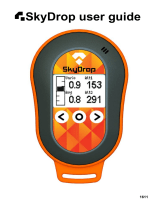
Telemetry-Box 2.4 GHz FASSTest
®
12
RECEIVER
>1 VARIO 1 2
3 TEk VARIO 3 2
5 TEMP 125 5 1
8 GPS 8 8
14.3 SENSOR SETUP MENU
The "Sensor Setup" menu shows all registered sensors. It
isalsopossibletoadjustvariousparametersforindividual
sensors.
Explanation, "Sensor Setup" main menu
The main menu displays the channels which are in use by
one sensor type, in addition to the sensor name and the
start channel.
For example, two channels (altitude and vario) are reser-
ved for a Vario sensor.
If multi-sensors are connected, e.g. the GPS multi-sensor,
eight channels are reserved for this sensor. The sensor
sequence can be set in the "Sensor Register" menu.
Sensor name
Start channel
Start channel
Channels in use by
sensor type
Explanation, "Sensor Setup" sub-menu
To move to the set-up sub-menu of a sensor, use the "-"
button to select the appropriate sensor, then press the
"ENT." button to confirm your choice.
For the Vario sensor the following screen display appears:
Now you can use the "-" or "+" button to select the sensor
type for which the setting is to be made.
Brieypressthe"ENT."buttontoacceptthesetting.
The following set-up sub-menu is shown with two screen
displays:
ALTITuDE SET
>VARIO SET
DISPLAY:
At the "Display" setting it is possible to program whether
the sensors are to appear in the list of screen displays or
not. For example, the desired sensors can be assembled
to form an individual display list.
SPEECH:
At this point it is possible to select whether the sensor is
to be included in the list of "Speech Output" displays (see
page 10, chapter 12). This enables you to select sensors
for which an optional speech output is to be generated.
This in turn improves the clarity of the speech output dis-
play.
SENSITIVITY:
Thisfunctionisusedtoadjustthesensitivityofthesensor.
Note:
If you have registered multiple vario sensors, but only
use one, you should select the "OFF" setting for the
sensors not in use. If you do not do this, you may find
the display difficult to understand, as it will show two
vario values.
Adjustment range:
OFF: Sensor disabled
LOW: +- 0.2 - +- 8m/s (Vario setting)
HIGH: +- 0.05 - +- 2m/s (TEK vario setting.
If thermals are strong, switch to LOW)
MIN VALUE:
At this point it is possible to select a minimum value, which
triggers an on-screen warning, the vibration alarm and an
audio alarm when it is reached.
Note:
The alarm can be switched off at any time using the "ESC"
button. If it is not switched off, it continues to sound for
the period of time defined under "WARNING DURATION"
(page 13).
Adjustment range: Sensor-specific
>DISPLAY: ON
LANGuAGE: ON
SENSITIVITY: HIGH
MIN VALuE: -3.0
WARNINGTONE: 6
MAX VALuE: +3.0
WARNINGTONE: 7





















